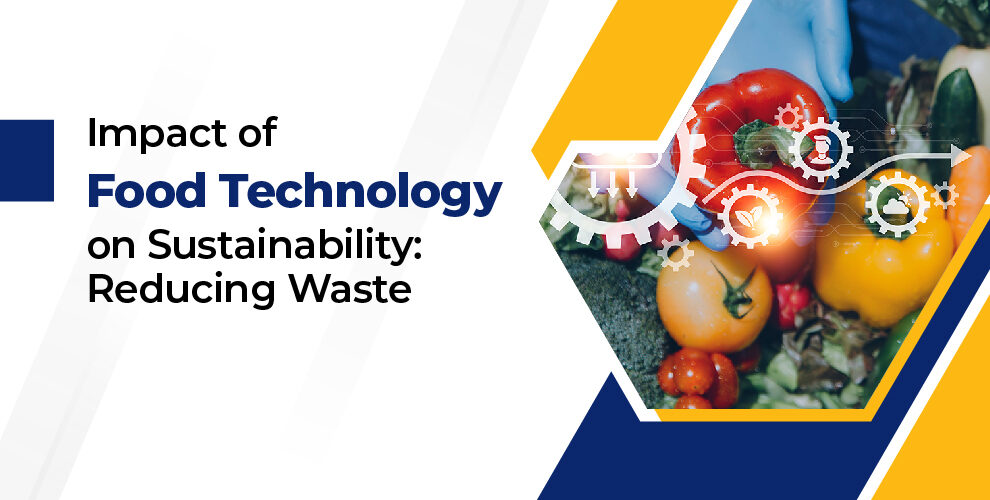Food is more than just a meal – it’s an opportunity to make a positive impact on our planet. That’s where food technology comes in!
In this blog, we delve into a journey exploring the ingenious ways food technology is reducing waste, revolutionizing sourcing, introducing alternative proteins, and optimizing supply chains. B.Tech Food Technology Colleges in Coimbatore are creating opportunities for the students to shine in the food industry.
1. Reducing Food Waste: Innovative Techniques
Improved Preservation Techniques
According to studies, increasing a food product’s shelf life can reduce almost 50% of consumer food waste. Innovative methods such as cold plasma and controlled atmospheres are preventing food waste, prolonging the shelf life of perishables, and guaranteeing that a greater proportion of our agricultural output reaches customers undamaged.
Smart Packing Solutions
Packaging composed of biodegradable or renewable materials reduces waste. There’s no reason for keeping materials that don’t exceed greener alternatives in landfills. Food shelf life is increased and spoiling is avoided by packaging food with premium materials.
Precision Agriculture Technologies
Through the integration of data analytics and IoT devices, precision agriculture optimizes crop yields, fostering a more efficient and sustainable farming process. Professionals who graduated from the top B Tech food technology colleges in Coimbatore are at the forefront of advancing precision agriculture.
2. Sustainable Sourcing: Farm-to-Table Initiatives
Local Sourcing Strategies
In the quest for sustainability, the primary focus is on local sourcing. This technique benefits the local economies and also minimizes the carbon footprint of long-distance transportation. This involves lowering greenhouse gas emissions and other pollutants that are hazardous to the environment and human health.
Vertical Farming Methods
Consider crops that thrive in tall towers, using fewer resources while producing more. Vertical farming is gaining popularity as a sustainable agriculture approach. An additional component of sustainability in vertical farming is the effective use of regional resources like land and water. They make better use of these resources than greenhouses and other agricultural practices.
Organic Farming Practices
Promoting organic and sustainable farming practices is critical for the future of our food systems. Organic farming employs biological fertilizers and pest control, compost, as well as environmentally beneficial techniques such as intercropping, mulching, crop rotations, and so on. Chemical fertilizers, growth regulators, insecticides, herbicides, and other chemical inputs are prohibited under this system.
3. Alternative Protein Sources: A Sustainable Future
Plant-Based Proteins
Food technology has helped to minimize reliance on traditional animal-based meat consumption. Alternative protein sources, such as lab-grown meat and plant-based proteins, have been produced by scientists. These techniques lower carbon footprints and negative environmental impacts by utilizing less water, energy, and land resources.
Cultured Meat Technology
Cultured meat technology appears to be a promising solution in the search for sustainable protein sources. Cultured meat, also known as lab-grown, clean, or cultivated meat, is created in a laboratory from a few animal cells. The goal is to develop a more environmentally friendly and humane meat industry.
4. Efficient Supply Chain Management: Minimizing Environmental Footprint
Smart Logistics Systems
Efficient supply chain management is pivotal for reducing environmental impact. Smart logistics systems, driven by data analytics and automation, ensure that goods move seamlessly from production to consumption, minimizing waste and energy consumption. The top 10 placement engineering colleges in Coimbatore equip their students with these technologies.
Cold Chain Optimization
The optimization of cold chains is critical for preserving the quality and safety of perishable goods. Technology-driven solutions, including temperature monitoring and real-time data analytics, ensure that the cold chain operates at its peak efficiency, reducing waste and supporting sustainability goals.
5. Future Outlook for Sustainable Food Production
Sustainable food production is at the forefront of tackling global concerns to feed an expanding population while reducing environmental damage. Several opportunities and challenges define the path of sustainable food technology as we move to the future.
Technology integration
The future of sustainable food production is intricately linked with technological advancements. Artificial intelligence (AI) and machine learning will empower farmers to make data-informed decisions, optimizing resource use and minimizing environmental impact. The top 10 Arts colleges in Coimbatore offer Food Technology courses which gives them a demanding future in the food industry.
Circular Economy Practices
The future of sustainable food production lies in embracing circular economy principles. Waste valorization and upcycling will transform by-products into valuable resources. From converting organic waste into biofuels to utilizing food remnants for fertilizer production, circular practices will reduce waste and contribute to a more closed-loop and resource-efficient system.
Regenerative Agriculture
The future will witness a shift towards regenerative agriculture practices. Farmers will focus on soil health, biodiversity, and natural ecosystem restoration. Techniques like cover cropping, crop rotation, and agroforestry will enhance productivity and also contribute to carbon sequestration and overall environmental health.
The fusion of education and technology is paving the way for a more sustainable future. Looking ahead, the potential for building a robust, effective, and sustainable global food system that feeds people and the environment lies in the combination of cutting-edge techniques and the combined efforts of stakeholders from throughout the food business.


